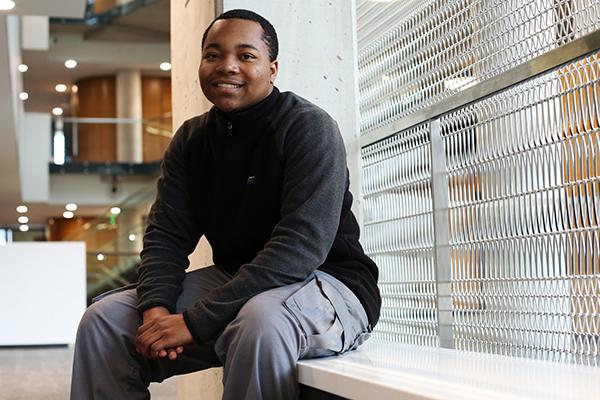One D.C. high school senior has dreamed of studying forensic science in college since he was a child.
Christian Ellis, a senior at McKinley Technology Education Campus, was accepted to the Class of 2020 and received a competitive scholarship for local high school students. Ellis has wanted to study at GW since he was 12 years old: He plans to major in biology and hopes to eventually get a master’s degree in forensic science.
Ellis said in an interview Thursday he also dreams of becoming the president of the Student Association and starting an anime club.
“I expect for this school to be challenging, and I expect for it to be a huge competition. What I want is to push forward with my dream. I want a huge competition and I want to be pushed to my limits – I am praying for it,” Ellis said.
Ellis qualified for the District Scholars program, which officials started in December to help bring low-income D.C. students to GW. In addition to a $7,500 award from the program, he earned $41,000 from GW – funds that will help cover the cost of his tuition.
Ellis said when he received the letter from GW last Tuesday telling him he earned scholarships and loans totaling $66,000, the “screams could be heard down the street.” In addition to the awards from GW, Ellis also qualified for a number of federal loans and a Pell Grant, which is given to low-income students.
“My mom screamed at the top of her lungs when she found out,” Ellis said.
His mother, Felicia Ellis, is a former program analyst at the National Institutes of Health. She said her son always loved school and is driven to succeed.
“Going to GW was all he talked about. To his counselor, me, his grandma, all the time – he didn’t care about any other admissions he got. They were all second place to GW,” she said.
The District Scholars program supports students whose families earn less than $75,000 a year. Students receive a $7,500 award from GW as well as a D.C. Tuition Assistance Grant. It is one of several ways officials have tried to bring low-income, minority and local students to GW over the past several years.
‘Leadership and business savvy’
Growing up, Ellis wasn’t always the high-achieving student that he is now. At the beginning of his sophomore year, his mother warned him that he was not taking school as seriously as he should.
“She told me, ‘You’ve got to show them you want to be a Colonial,’” he said.
Now, if you asked him about his extracurricular activities, it’s clear Ellis doesn’t spend much time sitting still.
He’s second in command of his Junior Reserve Officer Training Corps Army battalion and is the committee chair of Youth and Government. He is also in his school’s poetry club and gay–straight alliance. In his free time, he likes to perform as a disc jockey at school events and practice mixed martial arts, he said.
Desiree Raught, Ellis’s English teacher, said the senior stands out among his peers.
“Christian is such a hardworking student, but what really stands out to me is his leadership and business savvy. Watching him DJ and run the music for our ‘McKinley Tech’s Got Talent’ show was a chance to see him shine on all fronts,” she said.
McKinley Technology Education Campus is a public school near Howard University with a focus on science, technology, engineering and math. Students choose a “major” in biotechnology, engineering or information technology during their sophomore years.
This week, Ellis will help D.C. Chief Medical Examiner Roger Mitchell perform a “wet data experiment” for his senior project. He met Mitchell during a college preparatory program called Upward Bound, which was held at GW last summer.
For the experiment, Ellis will place two dead pigs in different environments in a forest in Maryland and take detailed notes about how the carcasses decompose. The conclusions from the experiment will help him understand more about the human body because it is similarly composed, he said.
He said Mitchell gave him the idea for the project and helped him prepare a plan.
“In the long run, this is the bread and butter of what I’m going to do: autopsy examinations,” Ellis said. “I’ve just been really ecstatic.”
He said in addition to GW’s science program, he is most excited to experience the diversity of campus – something he has enjoyed about his high school. More than 90 percent of students at McKinley Technology Education Campus are black, according to a report from D.C. Public Schools. About 35 percent of students admitted to GW this spring are multicultural, a percentage officials hope continues to grow.
“That’s the thing about coming to GW – I get that same diversity, but I get it on a larger scale,” Ellis said. “You don’t know who you’re going to meet.”







